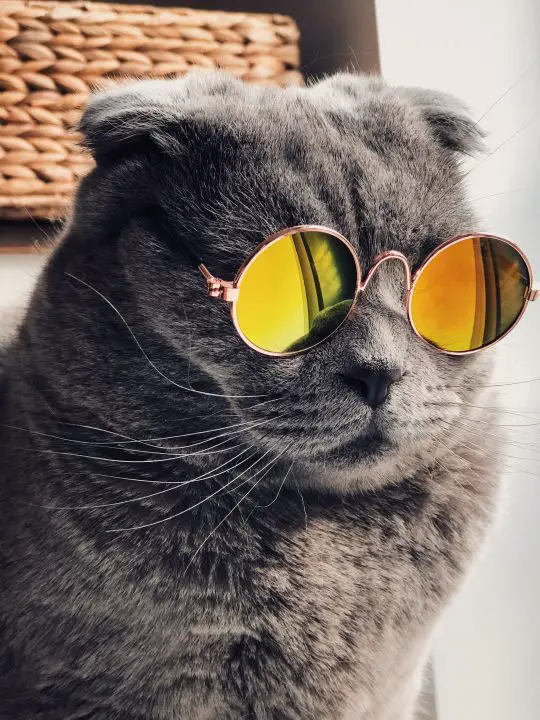As a cat owner, you want to ensure that your companion is going to live a long, happy, and healthy life. Yet, cats can be enigmatic, particularly when they are unwell. You may not always realize when your cat is feeling under the weather, which is why it is important to know how to keep a cat healthy.
Today, you are going to learn 10 ways to keep your cat healthy, regardless of their age. Let’s get started.

Table of Contents
- 1. Give Kitty The Right Kind of Diet
- 2. Play With Your Cat Often
- 3. How to Keep an Old Cat Healthy
- 4. Clean Out The Litter Box
- 5. Stay Away From Toxic Plants
- 6. How to Keep an Outdoor Cat Healthy
- 7. Groom Your Furry Friend
- 8. Have Regular Veterinarian Visits
- 9. Say Goodbye to Pesky Parasites
- 10. Gift Your Cat With a Scratching Post
- A Purrfect Bill of Health
- FAQs
1. Give Kitty The Right Kind of Diet
Want to know how to keep your cat a healthy weight? It’s all about the diet.
Like people, your cat’s abs are made in the kitchen. Okay, cats have no need of six-pack abs, but they do need high quality, wholesome food and access to fresh water. A balanced diet of dry and wet food ensures your cat is getting the right amount of nutrients and hydration. The proper cat calories are also important.
Also, be careful with “human food”. Consider how much salt and sugar is in many human foods. While your cat might truly love a salty piece of lunch meat, these treats do increase their risk of health issues, including obesity.
2. Play With Your Cat Often
Want to know a secret to making your cat love you? Play with them.
Cats are not as solitary and independent as they seem. Not only do they crave companionship from their humans, they also thrive on it. A little bit of playtime is not only a bonding experience, it’s also mental stimulation. They can think, plan, and burn some calories all at once.
Playtime also decreases anxiety in young cats and promotes better brain health in older ones. In fact, physical activity has been proven to delay the onset of dementia in cats.
3. How to Keep an Old Cat Healthy
You already know that playtime is essential to a cat throughout their lifetime. Even though your cat is well past their prime, that does not mean they are done with games. Let your older cat chase a string, play with crinkly toys, and roll around in catnip whenever you can.
Movement can also preserve their joints, but you shouldn’t make your older cat do too much. For example, if jumping up on the couch becomes too difficult, place a step stool near the sofa for your cat to use. Provide plenty of angled or horizontal scratching posts and hiding holes close to the ground.
Lastly, consider adapting your cat’s diet to their age. Using senior-grade food ensures they are getting the nutrients required for a longer life. Plus, senior cat food is designed to ease the burden on their tired kidneys; reducing the risk of kidney failure means a longer life for Kitty.
4. Clean Out The Litter Box
Do you have enough litter boxes in your house? Are you cleaning those boxes out regularly? For every cat you have, you need a litter box plus one more. That means a 3-cat household needs 4 boxes. Not only that, but you must encourage healthy litter box habits.
That’s not only up to your cat. Clean the box of poo and pee every single day. Once a week, empty out the contents of the box completely, adding in new litter. If you don’t, your cat could get a severe bacterial infection.
5. Stay Away From Toxic Plants
Plants like pothos and yucca are poisonous to cats. Those are not the only ones.
Many popular household plants and foods are toxic. Should you cat accidentally eat a leaf or nibble on a stem, they may have terrible side effects. Rather than tempting them, relocate any poisonous plants to somewhere out of reach or avoid purchasing such plants.
6. How to Keep an Outdoor Cat Healthy
Good food, clean water, and protection for fleas and ticks goes a long way in keeping outdoor cats healthy. However, there is one thing many cat owners overlook: spaying and neutering. Unfixed felines tend to wander and take risks, leaving them susceptible to injuries or even death. Spay or neuter your friend to spot their wandering.
You may also want to consider training your cat to walk on a harness, as this will stop them from bolting when scared and vanishing.
7. Groom Your Furry Friend
A lot of people overlook grooming their cat because they think cats can handle it themselves. While most cats groom fastidiously, brushing or combing your cat benefits them for a few reasons.
First, cats shed dead skin and fur regularly. When they clean themselves, there is a chance that they are digesting that fur, increasing their chance for fur balls and other digestive issues.
Secondly, regular grooming for both long- and short-haired helps with skin health. You may also notice any conditions with their skin while brushing, such as dander or rashes. Sore spots, bumps, and lumps are also easier to find.
And, of course, if you do detect an odd lump or bump, be sure to call your veterinarian. It could be a cyst or something else.
8. Have Regular Veterinarian Visits
Cats do not always appreciate what vets do, but regular checkups do help. Yearly vaccinations, dental work, flea prevention, and medication can preserve the health of your furry companion. Most feline illnesses can be prevented with health screenings and clean teeth.
9. Say Goodbye to Pesky Parasites
Fleas, ticks, and other pests can make life a living heck for your pets. Such discomfort leads to anxiety and stress—then to diminished happiness and health. Here is how to say goodbye to pesky pests.
Leaving pests unchecked is problematic, since the longer parasites affect your cat, the worse the side effects become. Therefore, keep your cats safe from fleas, ticks, and worms with oral and topical solutions.
10. Gift Your Cat With a Scratching Post
How do you keep an indoor cat healthy? By giving them plenty of things to claw. Now, since you don’t want kitty shredding the sofa, the best method for this is a scratching post (or several) in the house. Cats need scratching posts, because their nails grow and have sheaths that come off. When they remove the outer sheath, the nail can get longer.
There are many kinds of scratching posts out there, such as natural logs, cardboard, sisal rope, and so on. Try to introduce a scratching post to your kittens or cats as soon as possible, as this establishes good habits.
A Purrfect Bill of Health
How to keep a cat healthy? Give them food, water, and a little bit of love (on their terms). Cats, like all pets, are happiest and healthiest when they are nourished and relaxed. As an owner, you can make their lives the best ever by ensuring your cat is regularly seen by a vet and is eating a good diet.
FAQs
Choose a high-quality commercial cat food that is specifically formulated to meet the nutritional needs of cats. Make sure the food provides the necessary nutrients, including protein, fat, vitamins, and minerals. Avoid foods that list vague or low-quality ingredients. Choose cat food that is appropriate for your cat’s age and activity level. Divide your cat’s daily food allowance into multiple small meals throughout the day. If you want to give your cat treats, do so in moderation. And keep them hydrated!




